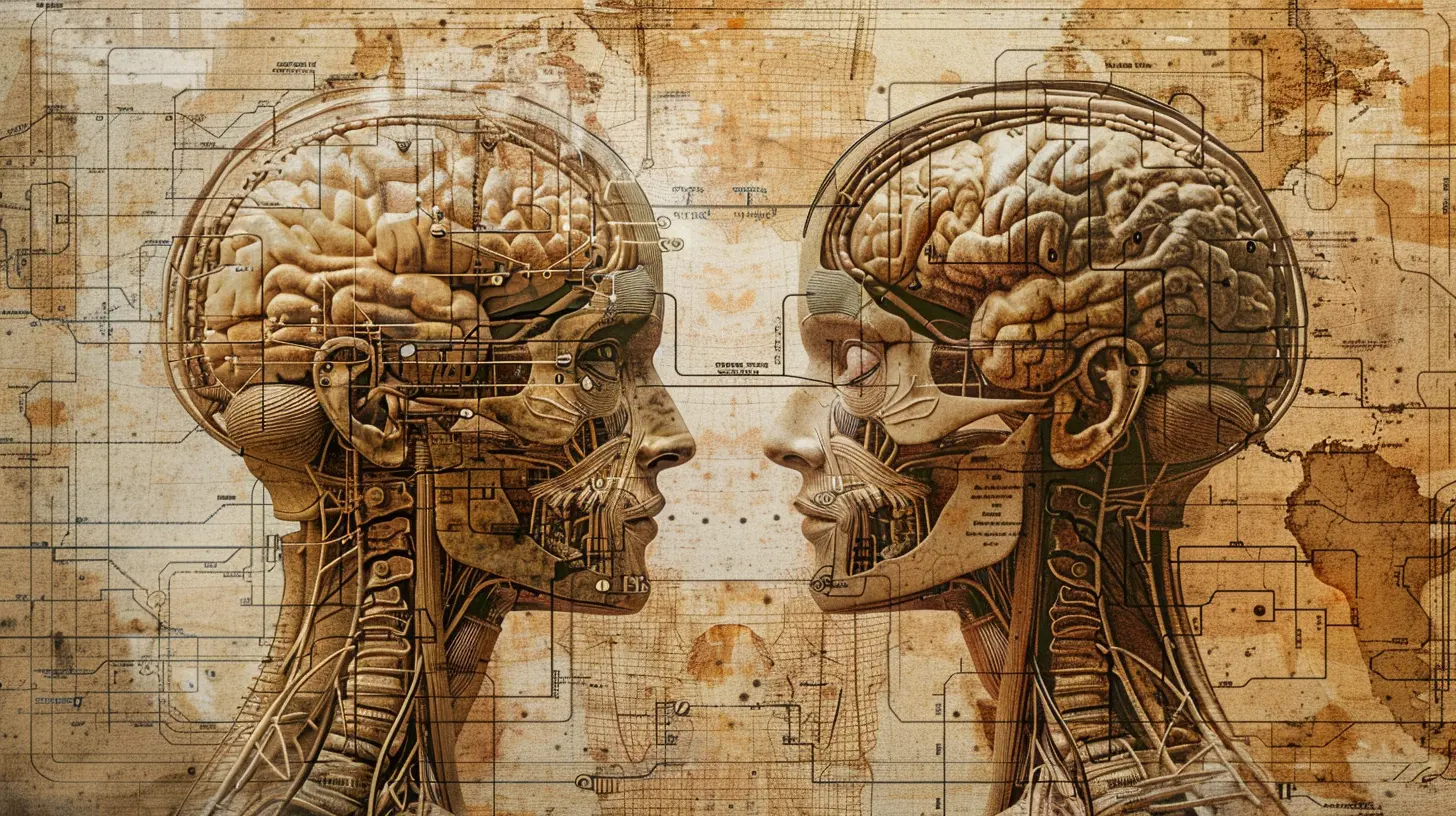The Evolutionary Psychology of Human Behavior: What Drives Us?
11 February 2025
Have you ever wondered why we do the things we do? Why we react a certain way in specific situations, or why some behaviors seem almost instinctual? The answer might not lie solely in our upbringing or personal experiences. Instead, a large part of what drives us comes from our evolutionary past. In this article, we’ll explore the fascinating world of evolutionary psychology and dive into how our ancient ancestors have shaped the modern behaviors we exhibit today.

What Is Evolutionary Psychology?
Before we dive into the details, let’s get a clear understanding of what evolutionary psychology is. Simply put, evolutionary psychology is the study of how our brains and minds have been shaped by the forces of evolution. It’s based on the idea that just like our bodies evolved to help us survive and reproduce, so did our minds.Think of it like this: Over thousands of years, certain mental traits or behaviors helped our ancestors survive in the wild. Those who were best suited to their environment were more likely to live long enough to pass on their genes. As a result, the mental traits that contributed to survival and reproduction became more common. Fast forward to today, and many of those ancient survival strategies still influence how we think, feel, and act.
But here’s the kicker: We no longer live in the same environment in which those traits evolved. Yet, our brains haven't caught up. This mismatch often explains why we sometimes respond irrationally or act in ways that don’t seem to make sense in modern society.

The Building Blocks of Evolutionary Psychology
To better understand how evolutionary psychology explains human behavior, we need to break it down into a few fundamental concepts:1. Natural Selection
You’ve probably heard this term before, right? Natural selection is the process where traits that help an organism survive and reproduce are more likely to be passed on to the next generation. In the case of human behavior, certain mental traits, like the ability to cooperate with others or avoid dangerous situations, were favored because they helped our ancestors survive.2. Adaptation
An adaptation is a trait that has evolved over time because it provides some advantage. In evolutionary psychology, behaviors or mental processes that promoted survival and reproduction are considered adaptations. For example, our fear of snakes or heights likely evolved because avoiding those dangers helped our ancestors stay alive.3. Fitness
In evolutionary terms, "fitness" doesn’t just refer to physical strength or health. It’s about reproductive success. Traits that increase an individual’s chances of passing on their genes are seen as contributing to fitness. So, behaviors that help you find a mate or care for offspring are key examples of fitness-enhancing traits.4. Mismatched Evolution
Here’s where things get interesting. Our brains evolved in an environment vastly different from the one we live in today. For most of human history, we lived in small, hunter-gatherer groups. But now, we live in a fast-paced, globalized society. Our ancient brains are sometimes at odds with our modern world. This can lead to behaviors that seem out of place, like overeating in a world where food is abundant or experiencing anxiety in situations that aren't actually life-threatening.
The Evolutionary Roots of Our Behavior
Now that we’ve covered the basics, let’s get into the fun stuff. Below, we’ll explore some common human behaviors and how they can be explained through the lens of evolutionary psychology.1. Fear and Anxiety: Why Do We Fear the Unknown?
Ever wondered why we’re scared of things like spiders, snakes, or the dark? These fears don’t seem super relevant in today’s world, where most of us don’t encounter deadly creatures on a daily basis. But for our ancestors, these fears were essential to survival.Imagine you're living in the wild thousands of years ago. If you weren’t cautious about dangerous animals or unfamiliar environments, you might not survive very long. Evolution favored those who were a little jumpy, those who avoided risks, because they were more likely to live and pass on their genes.
But here's the catch: Even though we live in relatively safe environments today, our brains haven’t entirely caught up. That’s why you might still feel a surge of anxiety when you're walking alone in a dark alley, even though the likelihood of encountering a deadly predator is slim to none.
2. Love and Attraction: The Science Behind Finding a Mate
Love might feel like magic, but it’s largely driven by evolutionary forces. At its core, love is a mechanism that evolved to help us find and bond with a mate, ensuring the continuation of our species.From an evolutionary standpoint, attraction often boils down to traits that signal health and fertility. For example, men might be subconsciously attracted to women with certain physical features that indicate fertility, like a healthy waist-to-hip ratio. Meanwhile, women might be drawn to men who display signs of strength, status, or the ability to provide resources.
Of course, modern love is much more complex than this, but it’s fascinating to think about how deep-rooted evolutionary impulses still play a role in who we find attractive.
3. Cooperation: Why Do We Help Others?
Humans are incredibly social creatures. We thrive on cooperation, and we often go out of our way to help others. But why? What’s the evolutionary benefit of being altruistic?In the past, working together increased the chances of survival. Think about it: A group of hunter-gatherers who cooperated to hunt or share resources was much more likely to survive than one where everyone fended for themselves. This led to the evolution of behaviors like empathy, fairness, and reciprocity.
Additionally, helping others also boosts our own chances of survival in the long run. In small communities, where everyone knows each other, helping someone today might mean they’ll help you tomorrow. This is known as "reciprocal altruism." Even today, we tend to help others, not just out of the goodness of our hearts, but because it strengthens social bonds and increases the likelihood that others will help us when we need it.
4. Aggression: Why Do We Get Angry?
Let’s face it—humans can be aggressive. But where does this aggression come from? Is it just a product of our environment, or is it something deeper?From an evolutionary perspective, aggression can be seen as a survival mechanism. In the wild, aggression helped our ancestors compete for resources, defend their territory, or protect their loved ones. Those who were able to successfully intimidate or fight off threats were more likely to survive and pass on their genes.
However, in today’s world, we don’t need to fight for survival in the same way. Yet, the underlying mechanisms that trigger aggression still exist. That’s why you might feel a rush of anger when someone cuts you off in traffic or insults you. Your brain is wired to protect you, even though these modern “threats” aren’t life-or-death situations.
5. Social Hierarchies: Why Do We Care About Status?
Why do people care so much about their social standing? Whether it’s chasing promotions at work, seeking validation on social media, or trying to climb the social ladder, our obsession with status is deeply rooted in evolutionary psychology.In ancient times, higher status often meant better access to resources, mates, and protection. Individuals who were at the top of the social hierarchy had a better chance of survival and reproductive success. As a result, the drive to achieve status became hardwired into our brains.
Even though modern society is less about survival and more about personal fulfillment, our brains still crave status. That's why we feel proud when we achieve something or why we’re drawn to people who are popular or successful.

How Evolutionary Psychology Explains Modern-Day Issues
Evolutionary psychology doesn’t just help us understand ancient behaviors. It can also shed light on some of the challenges we face in today’s world. For example:- Obesity: Our brains evolved in a world of food scarcity, so we’re wired to crave high-calorie foods. But in today’s world, where food is plentiful, this can lead to overeating and obesity.
- Anxiety and Depression: In the past, feeling anxious or down might have been adaptive because it helped us avoid danger or conserve energy. But in the fast-paced, high-pressure environments of today, these feelings can become chronic and harmful.
- Addiction: Our brains evolved to seek out rewards, like food, sex, and social connection. But in today’s world, this reward system can be hijacked by addictive substances or behaviors, leading to issues like drug addiction or compulsive social media use.
Conclusion: Understanding Ourselves Through Evolution
The field of evolutionary psychology offers us a unique lens through which to understand our behavior. While we like to think of ourselves as rational beings, much of what drives us is deeply rooted in our evolutionary past. By understanding the evolutionary origins of our behaviors, we can better navigate the challenges of modern life.So, the next time you wonder why you’re drawn to certain people, feel anxious in certain situations, or care so much about what others think of you—remember, it’s not just you. It’s the product of thousands of years of evolution, shaping your brain to help you survive in a world very different from the one we live in today.
all images in this post were generated using AI tools
Category:
PsychologyAuthor:

Eliana Burton
Discussion
rate this article
10 comments
Violet Good
This article brilliantly highlights how evolutionary psychology shapes our behaviors and motivations. Understanding these roots offers valuable insights into human nature, helping us navigate relationships and societal dynamics more effectively.
April 4, 2025 at 4:26 PM

Eliana Burton
Thank you for your thoughtful comment! I'm glad you found the article insightful in exploring how evolutionary psychology impacts our behaviors and relationships.
Matteo Brown
This article effectively highlights how evolutionary psychology provides crucial insights into human behavior, revealing the underlying biological and environmental factors that shape our decisions and social interactions. Thought-provoking read!
March 28, 2025 at 4:13 PM

Eliana Burton
Thank you for your thoughtful feedback! I'm glad you found the insights into human behavior engaging.
Dolores McLemore
This article insightfully connects evolutionary concepts to contemporary human behavior, highlighting the intricate interplay between nature and nurture in shaping our actions.
March 6, 2025 at 5:25 AM

Eliana Burton
Thank you for your thoughtful comment! I'm glad you found the connection between evolutionary concepts and contemporary behavior insightful.
Zeal Morrow
This article insightfully explores how evolutionary factors shape human behavior and decision-making processes today.
February 26, 2025 at 4:58 PM

Eliana Burton
Thank you for your thoughtful comment! I'm glad you found the exploration of evolutionary factors and their impact on behavior insightful.
Nina McCartney
Fascinating insights! Evolutionary psychology truly enhances our understanding of behavior.
February 21, 2025 at 5:04 PM

Eliana Burton
Thank you! I'm glad you found the insights compelling. Evolutionary psychology indeed offers a valuable lens through which we can understand our behaviors.
Greta Clayton
This article beautifully unravels the intricacies of our behavior! Understanding the evolutionary roots of our actions not only sheds light on our motivations but also reminds us that we’re all part of a shared, fascinating journey through time.
February 20, 2025 at 5:16 PM

Eliana Burton
Thank you! I'm glad you found the article insightful. Understanding our evolutionary roots truly enriches our perspective on human behavior.
Morrow Wilcox
Understanding our evolutionary past enriches our grasp of human behavior, revealing the complex motivations behind our actions.
February 20, 2025 at 4:30 AM

Eliana Burton
Absolutely! Exploring our evolutionary past provides vital insights into the underlying motivations that shape human behavior today.
Niva McMahon
Human behavior is not merely a product of culture but deeply rooted in our evolutionary past. Understanding these primal instincts offers clarity on our actions and motivations. Embrace the raw truth: we are wired to survive, compete, and connect. Recognizing this empowers us to navigate the complexities of modern life unapologetically.
February 18, 2025 at 4:23 AM

Eliana Burton
Absolutely! Recognizing our evolutionary roots enhances our understanding of behavior and motivations, helping us navigate modern challenges with greater insight.
Fenn McClary
Thank you for this insightful article on evolutionary psychology! It's fascinating to explore how our ancestral past shapes modern human behavior. I appreciate the clarity with which you explained complex concepts, making them accessible. Looking forward to more discussions on how these insights can enhance our understanding of daily interactions.
February 16, 2025 at 4:39 PM

Eliana Burton
Thank you for your kind words! I'm glad you found the article insightful. Looking forward to sharing more discussions on this fascinating topic!
Mila McGuffey
Understanding our roots empowers us to embrace growth and foster meaningful connections every day!
February 15, 2025 at 4:36 AM

Eliana Burton
Thank you for your insightful comment! Embracing our roots indeed enriches our understanding of human behavior and enhances our connections with others.
MORE POSTS

Stress Management for Parents: Balancing Family and Personal Time

How Deep Breathing Techniques Can Help Alleviate Stress

How Meditation Alters Brain Structure and Function

Cultivating Emotional Resilience in Challenging Times

Understanding Emotional Triggers and How to Heal Them

Emotional Intelligence in Parenting: Raising Emotionally Healthy Children

Integrating Yoga and Meditation in Therapy for Holistic Healing